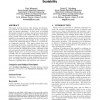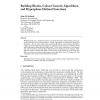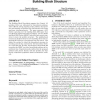185 search results - page 2 / 37 » Relative Building-Block Fitness and the Building Block Hypot... |
SIGGRAPH
2010
ACM
13 years 5 months ago
2010
ACM
: Shape-matching toys are popular items for infants, and consist of boxes with many holes in different shapes along with corresponding blocks of the same shapes. To play with the t...
GECCO
2006
Springer
13 years 9 months ago
2006
Springer
This paper extends previous work showing how fluctuating crosstalk in a deterministic fitness function introduces noise into genetic algorithms. In that work, we modeled fluctuati...
CEC
2005
IEEE
13 years 11 months ago
2005
IEEE
The building blocks are common structures of high-quality solutions. Genetic algorithms often assume the building-block hypothesis. It is hypothesized that the high-quality solutio...
EC
2000
13 years 5 months ago
2000
Building blocks are a ubiquitous feature at all levels of human understanding, from perception through science and innovation. Genetic algorithms are designed to exploit this prev...
GECCO
2007
Springer
13 years 9 months ago
2007
Springer
The Building Block Hypothesis suggests that Genetic Algorithms (GAs) are well-suited for hierarchical problems, where efficient solving requires proper problem decomposition and a...



